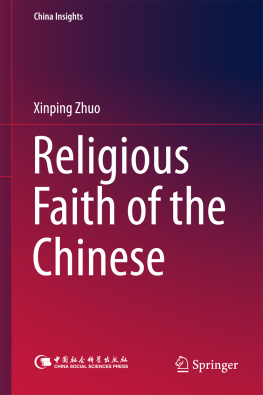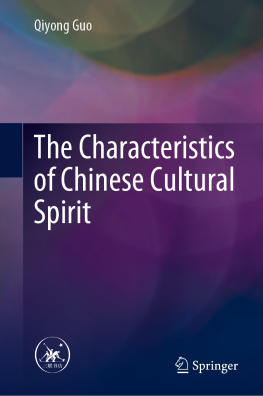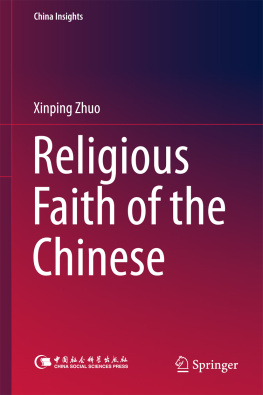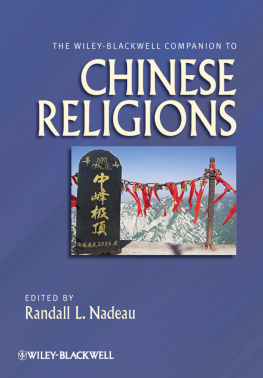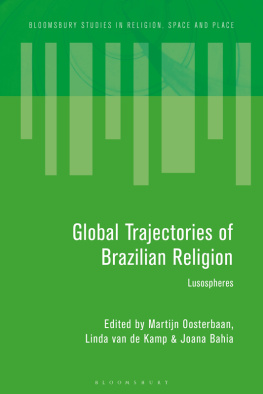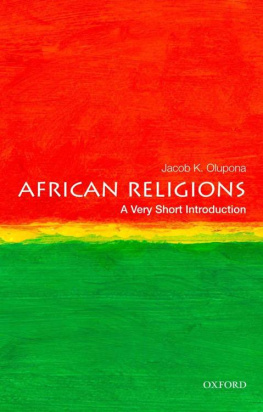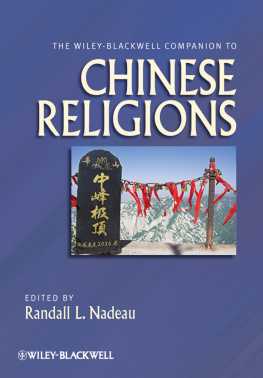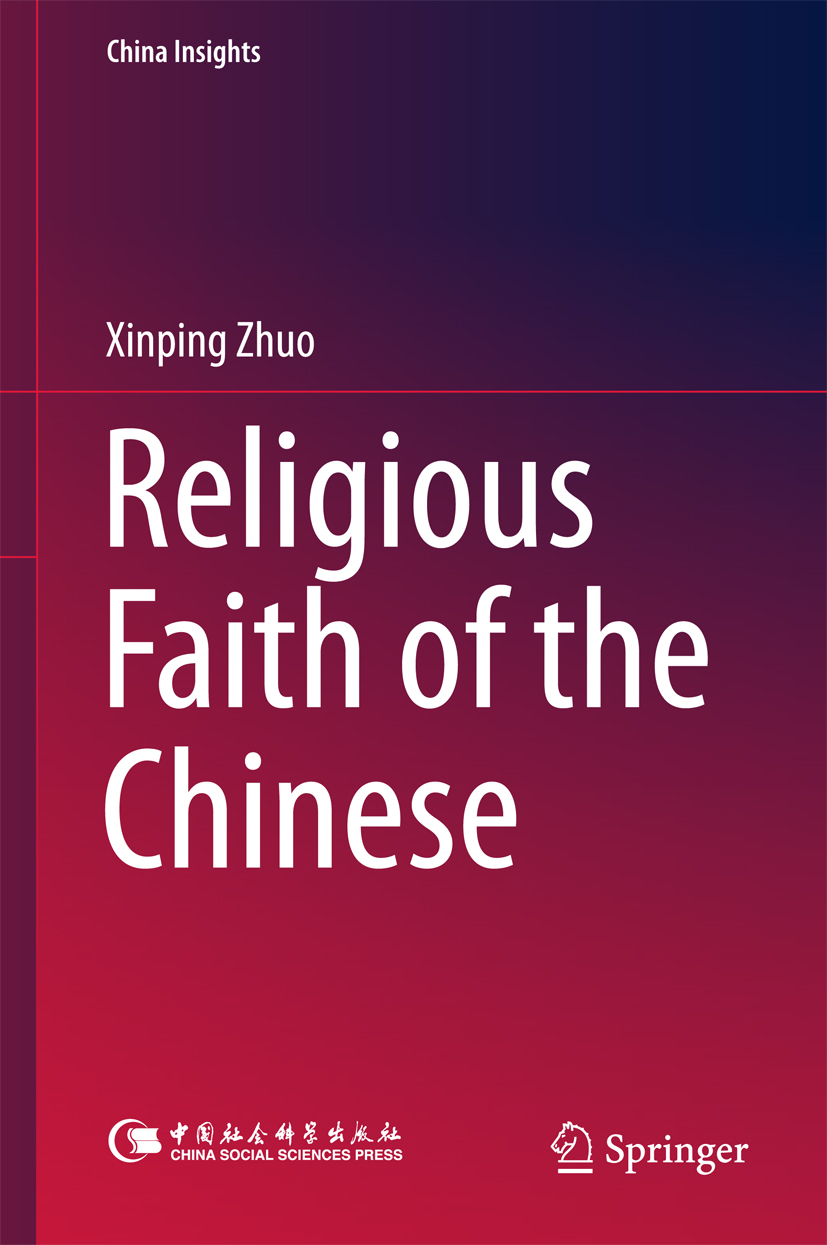China Insights
This book series collects and presents cutting-edge studies on various issues that have emerged during the process of Chinas social and economic transformation, and promotes a comprehensive understanding of the economic, political, cultural and religious aspects of contemporary China. It brings together academic endeavors by contemporary Chinese researchers in various social science and related fields that record, interpret and analyze social phenomena that are unique to Chinese society, its reforms and rapid transition. This series offers a key English-language resource for researchers and students in China studies and related subjects, as well as for general interest readers looking to better grasp todays China. The book series is a cooperation project between Springer and China Social Science Press of China.
More information about this series at http://www.springer.com/series/13591
Xinping Zhuo
Religious Faith of the Chinese
Xinping Zhuo
Institute of World Religions, Chinese Academy of Social Sciences, Beijing, China
ISSN 2363-7579 e-ISSN 2363-7587
China Insights
ISBN 978-981-10-6378-7 e-ISBN 978-981-10-6379-4
https://doi.org/10.1007/978-981-10-6379-4
Library of Congress Control Number: 2017952917
The printed edition is not for sale in China Mainland. Customers from China Mainland please order the print book from China Social Sciences Press.
Springer Nature Singapore Pte Ltd. and China Social Sciences Press 2018
This work is subject to copyright. All rights are reserved by the Publisher, whether the whole or part of the material is concerned, specifically the rights of translation, reprinting, reuse of illustrations, recitation, broadcasting, reproduction on microfilms or in any other physical way, and transmission or information storage and retrieval, electronic adaptation, computer software, or by similar or dissimilar methodology now known or hereafter developed.
The use of general descriptive names, registered names, trademarks, service marks, etc. in this publication does not imply, even in the absence of a specific statement, that such names are exempt from the relevant protective laws and regulations and therefore free for general use.
The publishers, the authors and the editors are safe to assume that the advice and information in this book are believed to be true and accurate at the date of publication. Neither the publishers nor the authors or the editors give a warranty, express or implied, with respect to the material contained herein or for any errors or omissions that may have been made. The publishers remains neutral with regard to jurisdictional claims in published maps and institutional affiliations.
Translated by Dong Zhao
Printed on acid-free paper
This Springer imprint is published by Springer Nature
The registered company is Springer Nature Singapore Pte Ltd.
The registered company address is: 152 Beach Road, #21-01/04 Gateway East, Singapore 189721, Singapore
Series Foreword
Since the Opium War, modern China has come under attack and been bullied for its backwardness; this cultural circumstance has given many Chinese people a psychological inferiority complex, as China has lagged behind other countries technologically, institutionally, and culturally. Efforts to change the situation in which Western countries were strong but China was weak and to revitalize China needed to start with cultural criticism and culture renovation. Therefore, the Chinese people turned their eyes to the outside world and learned from Japan, Europe, the USA, and even Soviet Russia. We have always been overwhelmed by stress and anxiety and have had a burning desire to reverse the state of being bullied as a result of underdevelopment, poverty, and weakness and to catch up with and surpass the Western powers. In pursuing the more than one-hundred-year-old dream of building a powerful country and reviving China, we have focused on understanding and learning from others, but seldom, if ever, have others learned from and understood us. This has not greatly changed in the course of modernization since Chinas reform and opening up in 1978. The translation and introduction of many Westernworks in the 1980s and 1990s is a very good example. This is the history of the Chinese peoples understanding of the relationship between China and the rest of the world since the beginning of modern times.
At the same time, in pursuing the dream of turning China into a powerful country and rejuvenating it through material (technological) criticism, institutional criticism, and cultural criticism, the Chinese people have struggled to find a path that would make the country prosperous and the people strong while preventing the country from being ruined and the race from being destroyed. This path first represents a thought, a banner, and a soul. The key issue has been what kind of thought, banner, and soul can save the country, making it prosperous and the people strong. For more than one hundred years, the Chinese people have constantly carried out experiments and attempts amidst humiliation, failure, and anxiety. They have experienced failure in adopting advanced Western technology and thought on the basis of safeguarding Chinas feudal system and practicing a constitutional monarchy after the collapse of the Western capitalist political path and a great setback in worldwide socialism in the early 1990s. The Chinese people ultimately embarked on a path toward a successful revolution with national independence and liberation; in particular, they have adopted a path leading to the socialist modernization of Chinaa road toward socialism with Chinese characteristicsby combining the theoretical logic of scientific socialism with the historical logic of Chinas social development. After more than 30 years of reform and opening up, Chinas socialist market economy has rapidly developed; tremendous achievements have been made in economic, political, cultural, and social constructions; comprehensive national strength, cultural soft power, and international influence have substantially improved; and a great success has been achieved in socialism with Chinese characteristics. Although the latter project has not yet become full-fledged, its systems and institutions have basically taken shape. After more than one hundred years of pursuing dreams, China is rising among the nations of the world with a greater degree of confidence in the path it has chosen, the theory it has adopted, and the institutions it has created.
Meanwhile, we should be aware that given the long-standing cognition and cultural psychology of learning from Western countries; we seldom take the initiative in showcasing ourselveshistorical China and current China in realityto the world, though China has emerged as a great world power. Due to a deeply rooted view that Western countries are strong and China is weak, developed through Western-Chinese cultural exchanges, Western people and nations seldom have a sense of Chinese history or the current developments in China, let alone an understanding of Chinas developmental path and such in-depth issues as the scientificity and effectiveness of Chinas theory and institutions or their unique value for and contributions to human civilization. As self-recognition is not displayed, the China Collapse Theory, China Threat Theory, China State Capitalism, and other so-called theories coined by certain people with ulterior motives and differing political views have been widely spread.

